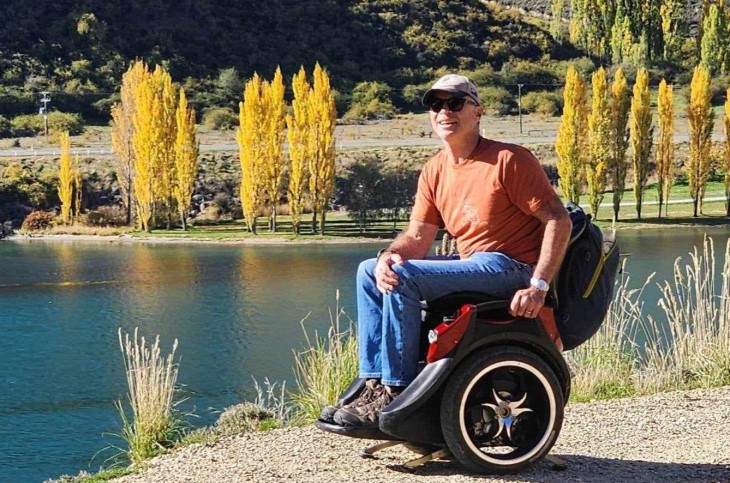Dan Buckingham: The road to a fully inclusive society
As we celebrate International Day of Persons with Disabilities this week, ACC Board Member and Paralympian Dan Buckingham reflects on the progress of the disability movement and how ACC can play a leading role in achieving a fully inclusive society.
Disability advocate Dan Buckingham says 3 December is a pivotal day in the year.
It’s when the world celebrates International Day of Persons with Disabilities, and Dan believes the significance of the day should not be underestimated.
“It’s a day when we get to shine the spotlight on disability – we shouldn’t gloss over that,” he says.
“Year round, there’s work to be done and work being done. But it’s good to have one day where we can really bring to the forefront the issues we still face – the challenges, the attitudes and the mindsets around disability – and the expectations about what someone with disability can achieve.”
Dan himself is a prime example of what can be achieved.
At 18, he became paralysed from the chest down from a rugby injury. But sport continued to play a huge part in his life.
He went on to star for the Wheel Blacks wheelchair rugby team, winning gold at the 2004 Paralympic Games in Athens before captaining the side in Beijing four years later.
Away from the court, his achievements have been just as impressive.
He became CEO of Attitude Pictures, helping change perceptions of disability through engaging content, and is now CEO of Able, championing the goal of equal access to audiovisual media.
Dan also serves on the board of ACC and several other organisations.
As if that wasn’t enough to keep him busy, he’s also a husband and father of two, navigating the challenges of parenting from a wheelchair with wife Samantha.
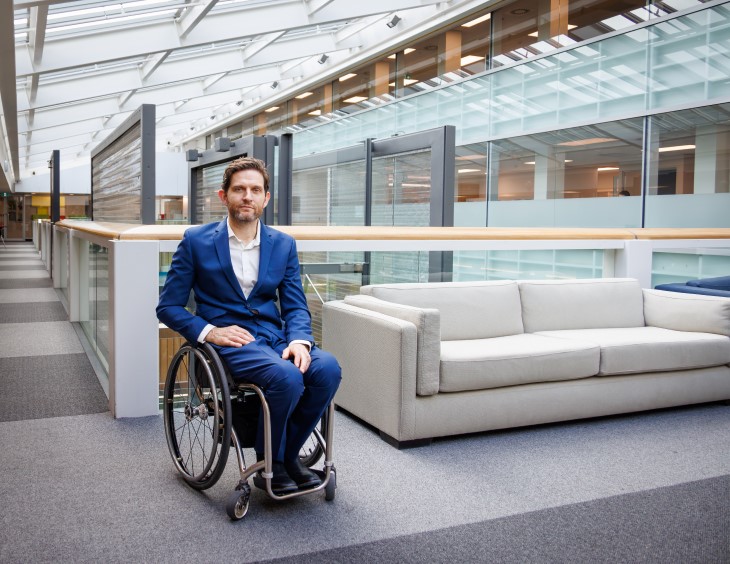
‘Disability has come a long way’
Having lived with a disability for 25 years, Dan says there’s been some massive changes in the way the disabled community is perceived.
“I think disability has come a long way in a relatively short amount of time. We were pretty late to the human rights movement, hitting our straps in the 80s,” he says.
“There are people who were part of that movement who are still very much at the forefront of doing good work now. They fought hard for the rights of people like me so I could live my life the way I do.
“Now there’s been a shift from needing to bang the table for people to hear. We’re into a phase of embracing curiosity, letting people be open to being intrigued by disability and having a conversation about it, and creating a safe space to do so.”
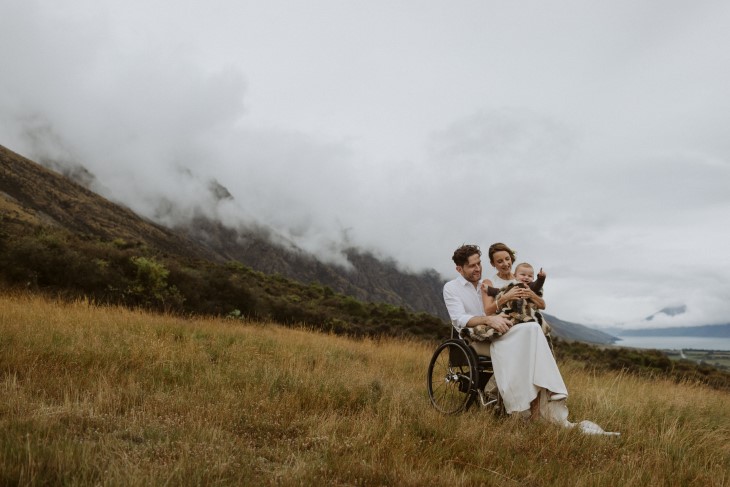
Dan Buckingham with wife Samantha and daughter Etta on their wedding day.
An opportunity to lead by example
As both a member of the board and an ACC client, Dan has a unique perspective on how ACC supports the disabled community.
As well as providing support to disabled clients to help them lead independent lives, Dan thinks ACC can set an example as an inclusive employer.
“Disability is so varied and cuts across all demographics of society – but there are common themes that cut through every disability. Education is one, and employment is another,” he says.
“If organisations can open their eyes to the opportunity to have disabled people join their organisation, that’s where we’ll get to a fully inclusive society – where it’s normal to have a colleague who has a disability, and it’s normal to be around disability.
“I think ACC can really lead in that space.”
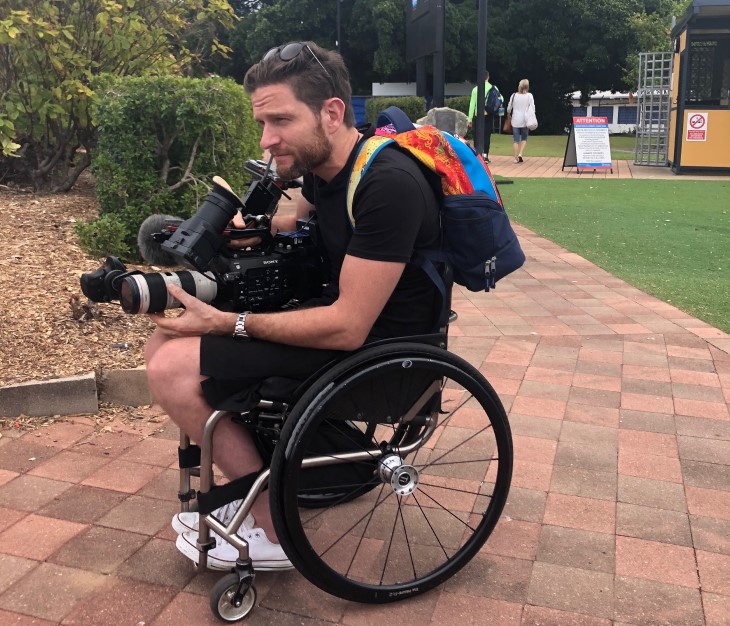
Supporting disabled kaimahi and kiritaki
Dan is pleased to see ACC introduce our ‘Ability Network’, which connects disabled kaimahi (staff) and their allies within the organisation, providing resources and support to both people leaders and team members, allowing them to flourish in their roles.
ACC is also leading the way in making sure our buildings are accessible.
The recently-opened branch in Hamilton and another new build currently taking shape in Dunedin were both designed with world-class standards of accessibility in mind, both for the hundreds of kaimahi who work there and the many kiritaki (clients) who come through the doors.
“One of the cool things about being on the board is that we don’t just sit around a table in Wellington making decisions – we get to go out and see what it’s like for staff and clients around the country,” Dan says.
“The Hamilton building is a perfect design for accessibility and it’s a beautiful space that works well for everyone.”
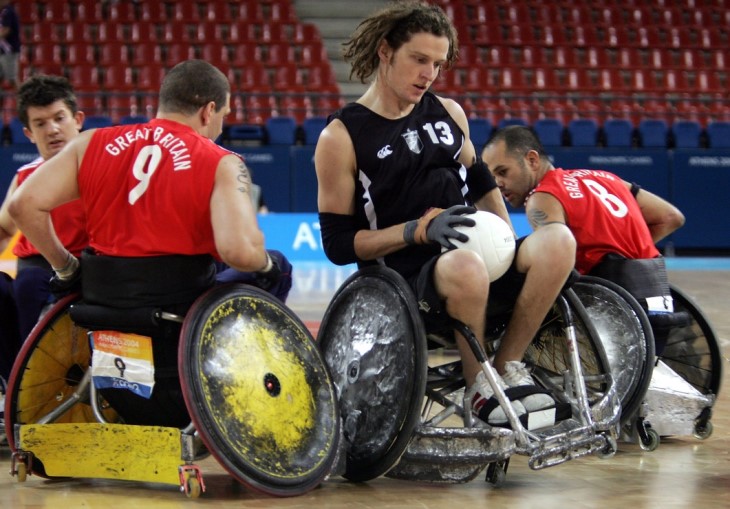
Dan Buckingham in action on the way to winning gold at the Paralympic Games in 2004.
The power of sport
ACC is providing further support to the disabled community through Paralympics New Zealand, which it partners with to deliver the Para Sport Collective and LevelUp programmes.
The Para Sport Collective provides support to pre-high performance Para athletes and coaches to achieve their goals, while LevelUp provides online resources to help coaches gain the skills and confidence they need to coach disabled athletes.
“Looking back, getting involved with sport totally accelerated my life, in terms of living well with a disability,” Dan says.
“Physically, getting the most out of my body was a big part of it but also being around other people who had gone through what I was going through was huge.
“But I’m also very aware that sport’s not for everyone, so how do we replicate those opportunities and create connections in other areas to make sure people aren’t isolated?”
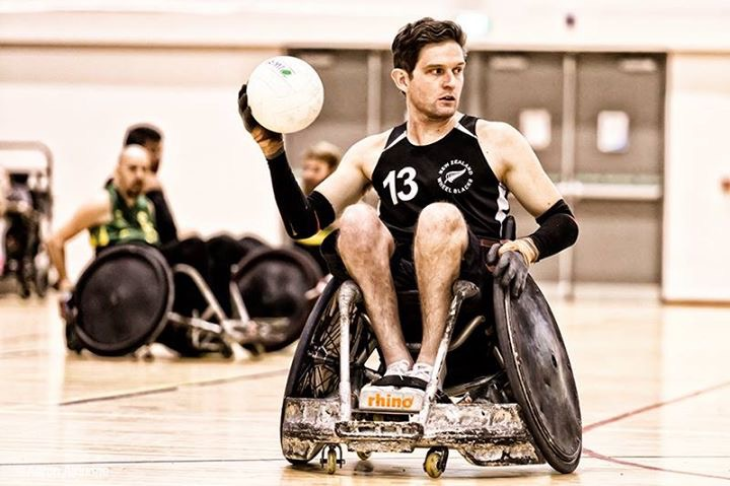
Dan Buckingham looks to pass the ball for the Wheel Blacks in 2015.
Overcoming barriers to an inclusive society
Dan became a member of the ACC Board in June of this year and is aiming to use his influence to help us play our part in achieving a fully inclusive society in New Zealand.
“There’s always going to be a range of attitudes in the way people interact with someone with disability, and I think that’s still our biggest barrier,” he says.
“From low expectations to not seeing the person and instead seeing the disability, or the disability aid. People often give me a wide berth when they see the wheelchair and I’m like, ‘Dude, I’ve got a pretty small wheelchair’.
“All those little things add up to the fact there is still work to be done in terms of normalising disability and having the fully inclusive society we all seek.”
International Day of Persons with Disabilities
Established by the United Nations in 1992, the day takes place on 3 December this year and aims to promote an understanding of disability issues, mobilise support for the dignity, rights and wellbeing of persons with disabilities, and advocate for their inclusion in all aspects of society and development.
The 2018 census shows 24.5 per cent of New Zealanders identify as living with some form of disability, which equates to around 1.1 million people.
Every year, ACC supports around 7,000 New Zealanders with a serious injury and many other disabled people who injure themselves.



